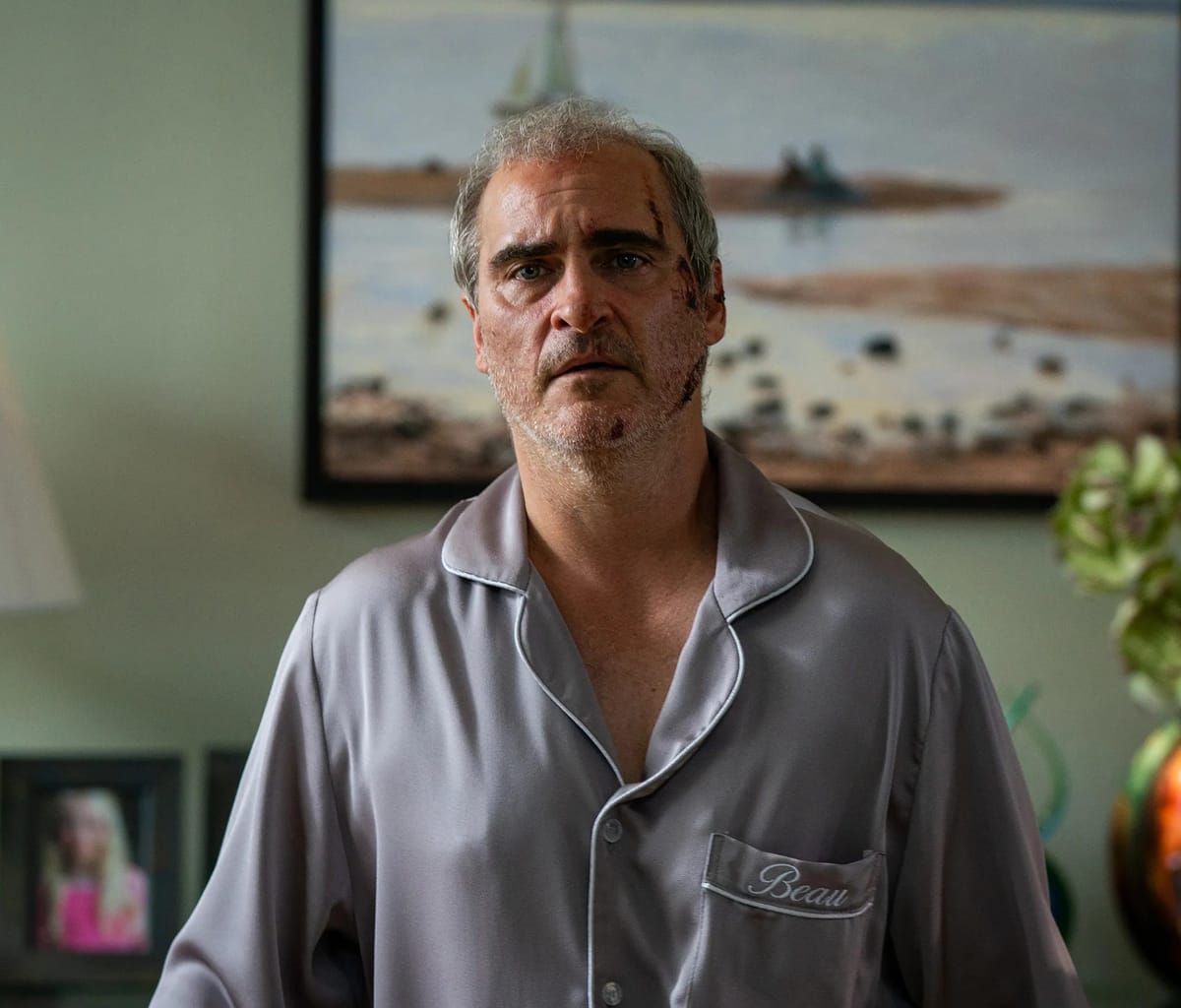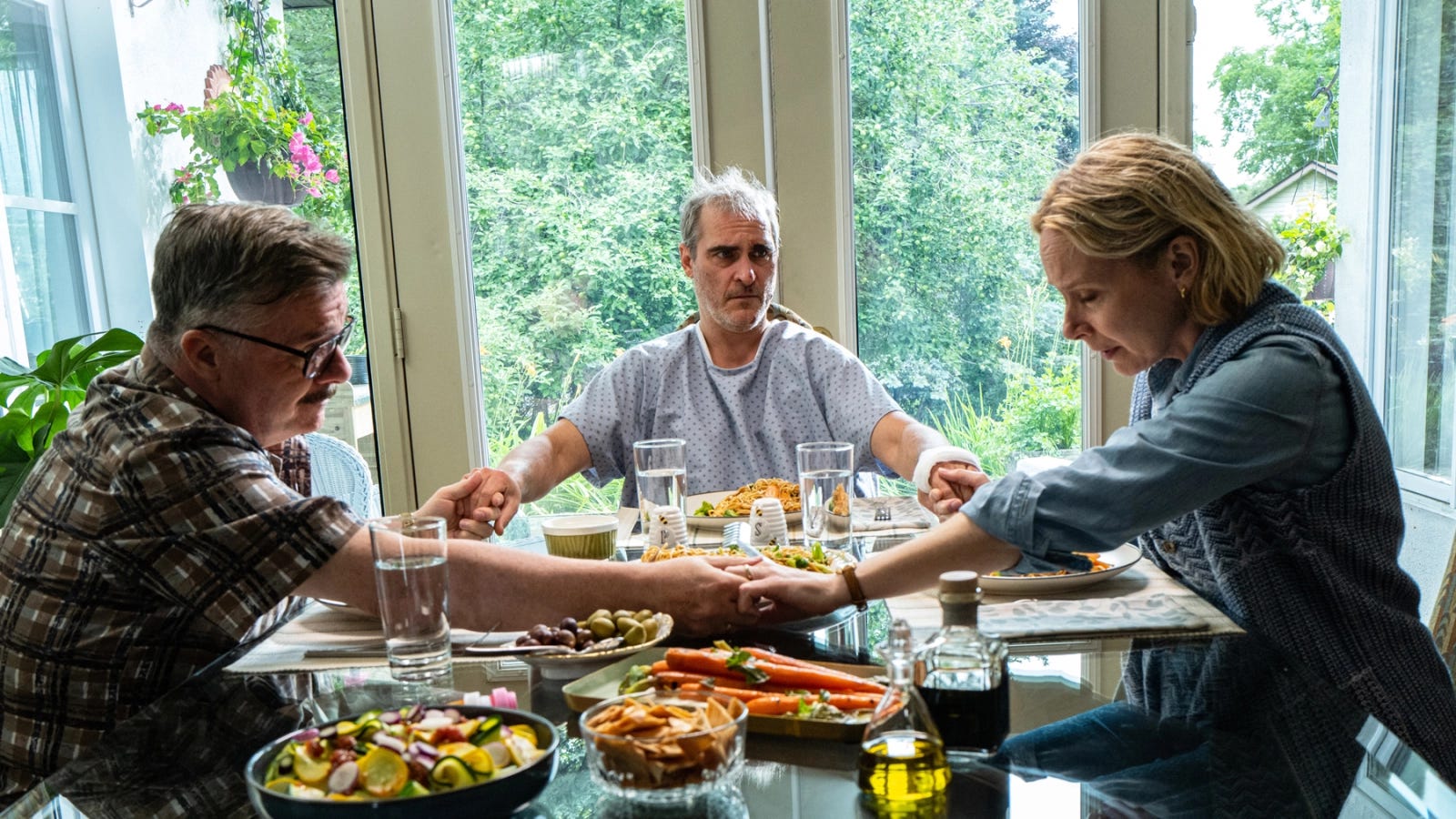What To Watch: Oedipus Wrecked
Reviews of "Beau Is Afraid," "Chevalier," "Little Richard: I Am Everything," "Judy Blume Forever," and more.

There’s a certain kind of movie director – invariably male – who will reach a level of cultural fame or profitability or industry clout and decide that it’s time to make a film that really means something. This often ends in a face-plant of sizable, sometimes titanic, proportions – Michael Cimino came out of “The Deer Hunter” (1978) a newly minted auteur and brought down a studio with his next film, 1980’s “Heaven’s Gate.” Sometimes the follow-ups go big, like Coppola’s “Apocalypse Now,” and sometimes they go weird, like “Brewster McCloud” (1970), Robert Altman’s flaky, fabulistic follow-up to “M*A*S*H,” or David O. Russell’s “I Heart Huckabees” (2004), a movie I both adore and find impossible to defend.
Now it’s Ari Aster’s turn. Aster made his name with “Hereditary” (2018) and “Midsommar” (2019), two unnerving films that sat just enough inside the horror genre to bring in the crowds and just enough outside it to earn him mainstream critical respect and a fuzzy reputation as a next-gen filmmaking visionary — the poster boy for the A24 indie revolution. It was almost predictable that his third movie would be a big, big swing, but I don’t think anyone was expecting a three-hour surrealist horror-comedy-drama about urban decay, existential despair, and castrating mothers.
The movie is called “Beau Is Afraid” (in theaters, ⭐ ⭐), and it is exhausting.
Joaquin Phoenix deserves some kind of medal for playing the title character, a nervous wreck and modern-day Caspar Milquetoast whose journey to visit his mom becomes a nightmarish Stations of the Cross. The film is structured in four acts: The first finds Beau trying to leave his squalid apartment in a war zone of a neighborhood so over-the-top violent that it’s both absurdly funny and everything Marjorie Taylor Greene thinks is true about New York City. From there, he is taken in by a kindly suburban couple, played (terrifically) by Amy Ryan and Nathan Lane, whose real motives are never clear but also never not sinister. Then it’s out to the woods, where Beau falls in with a ragtag group of theater hippies and has an epic animated vision of his future life as a wandering Job – by far the most inspired and moving segment of this ambitious cinematic torture wheel.

In the final act of “Beau Is Afraid,” the hero finally makes it to Mama’s house, but not before a brief interlude with the long-lost love of his life, who’s played by Parker Posey with a take-charge energy the movie could use more of. Too brief, in fact, because here comes the mother in the form of Patti Lupone, uncorking a voice that could emasculate a Great Dane at 50 paces.
Aster’s script becomes painfully obvious at this point, the subtext pouring out and swamping the text the way of the movie’s profusion of amniotic water imagery swamps poor Beau’s journey. “Beau Is Afraid” is not without humor or the courage to leap off the cliffs of the ridiculous – you won’t believe what Mama has locked up in her attic, although Sigmund Freud would. And I guess it’s nice to see a big-budget moviemaker unafraid of his own pretensions, but it would be preferable if those pretensions worked as part of an organic, cohesive narrative rather than as notes for a nervous breakdown to be scheduled for a future date. Interestingly, the movie I was reminded of the most was “Brazil,” Terry Gilliam’s 1985 Orwellian burlesque. Now there was a film with the courage of its own madness. “Beau Is Afraid,” by contrast, edges close to the fire but never truly risks getting burnt, although the occasional charring is remarkable to behold. It’s a gifted filmmaker’s therapy session, and we’re paying for it.
Also in theaters this week, the disappointing “Chevalier” (⭐ 1/2), of which I had this to say when it premiered at the Toronto Film Festival last fall:
Or: How to take a grand subject – the life and times of 18th-century Creole violinist-conductor-composer Joseph Bologne – and dumb it down into a strident, shallow melodrama pitched at the kids in the rear balcony. A surprising dud given the talent involved: star Kelvin Harrison Jr. (“Luce”), director Stephen Williams (“TV’s “Watchmen”), screenwriter Stefani Robinson (TV’s “Atlanta,” “What We Do in the Shadows”). Maybe the leap to the two-hour film format threw them, but this is a lot more simplistic than anything they’ve made for the small screen.
On a more positive note, a few excellent documentaries are available on demand starting today. “Little Richard: I Am Everything” (⭐ ⭐ ⭐ ⭐), one of the best movies I saw at this year’s Sundance Film Festival, arrives in theaters and on all streaming rental platforms today. In January, I wrote:
It’s a documentary that takes the standard rock-bio format and gives it a good shake, sticking to a linear timeline but broadening the context far beyond what could be discussed during the life of the late, great Richard Penniman. That includes Little Richard himself, who careened between what he was and what he “should be” for the bulk of his life. A ground-level founding father of rock and roll, he was Black and exuberantly gay at a time when there was no language for someone like him in the mainstream. (The singer called himself “the bronze Liberace,” and it’s an apt comparison: Both men had rabid female followings that never cared to connect their flamboyance to their sexuality.) He was also born into the Black church and periodically renounced rock for religion and his outrageously out self for the straitjacketed existence of a self-loathing gay man. “Little Richard was very, very good at liberating others through his example,” someone says here. “He was not very good at liberating himself.”
But the archival clips of the singer on stage “liberating others” are joyfully incendiary – an unimaginable affront to everything mid-50s American culture was hellbent on repressing. What on earth were we supposed to think when “Good golly Miss Molly – sure likes to ball” came rocketing through the transistor radio? Director Lisa Cortés has the expected musical colleagues and family members as talking heads but also brings on a host of cogent, empathetic cultural critics, academics, and pop descendants like Billy Porter to connect the dots between who Little Richard was, what he signified, and the cultural landscape he made possible.
Amazon has “Judy Blume Forever” (⭐ ⭐ ⭐), which doesn’t break any new formal ground but is simply a graciously spiky hour and 40 minutes spent in the company of the pioneering author of “Are You There, God? It’s Me, Margaret,” “Deenie,” “Blubber,” and other books that spoke directly to the questions and fears of middle-schoolers while freaking out (and continuing to freak out) certain adults. Directors Davina Pardo and Leah Wolchok chart Blume’s journey from a nice Jewish girl “with a bad girl lurking inside” to a suburban mom to a dissatisfied suburban mom to a writer who could talk about sex and masturbation and bras in ways that had young readers certain she saw the insides of their brains to an activist fighting against the Reagan era censorship wars that predate our current book-banning battles.
Now 85, Blume’s journey and activism continue, but the most emotionally affecting scenes by far in “Judy Blume Forever” address the deluge of letters the author received week after week and month after month from young girls and boys desperate to talk to someone about their lives – lives that sometimes hid horrific secrets. Those letters now reside in a collection at Yale, and as Blume reads through them, the filmmakers cut to the letter-writers themselves, now grown women and men, who testify to the lifelines of compassion they received by reply in the mail. The movie’s a reminder of values that sometimes can seem beaten out of this world – honesty, empathy – but can be rediscovered simply by opening the pages of a book. Nice timing, too: A film version of “Are You There, God? It’s Me, Margaret” opens next week, and by all accounts it stays true to the essential kindness of its source and the woman who wrote it.
Classic of the Week: “Rachel, Rachel” (1968, ⭐ ⭐ ⭐ ⭐), the directorial debut of one Paul Newman, showcasing a performance by his wife, one Joanne Woodward, as a small-town schoolteacher who slowly rediscovers an inner life and strength she never knew were there. Observant and far too-little seen, the movie remains an incisive character study, an indie-film pioneer decades ahead of its time, and a high point in both Newman’s and Woodward’s filmographies. Turner Classics is airing a newly restored print tonight (Friday) at 10 p.m., with an intro by Ethan Hawke, as part of the channel’s month-long centenary tribute to Warner Brothers. DVR this one if you know what’s good for you.
Some housecleaning: Of course right after I published my post this week about the terrible sound quality of the average TV experience, Amazon announced its new “Dialogue Boost” feature, which allows viewers to increase the volume of actors’ voices without turning up the surrounding music or sound effects. Unfortunately, it’s available for now only on select “Amazon Original” series and movies, but it will be interesting to see if A) the feature works and B) if it gets adopted by other streaming services. Clarity may at last be at hand.
A busy week in Freelance Land: A perennial item on this writer’s bucket list has been to pen one of those “Letter of Recommendation” columns for the New York Times Magazine, and this week I got a chance. It’s about birds (obviously) and the revelatory migration website BirdCast, and you can read it here.
And for today’s Washington Post, I wrote an op-ed column on the subject of Netflix shuttering its DVD-by-mail business after 25 years, and what that means for film lovers, the general public, and a media culture where a movie no longer exists if it isn’t available on demand.
Okay, I’m going to go lie down for a bit. Have a lovely weekend.
Thoughts? Don’t hesitate to weigh in.
If you enjoyed this edition of Ty Burr’s Watch List, please feel free to pass it along to friends.
If you’re not a paying subscriber and would like to sign up for additional postings and to join the discussions — or just help underwrite this enterprise, for which the management would be very grateful — here’s how.





